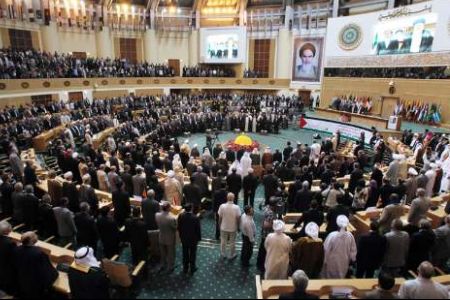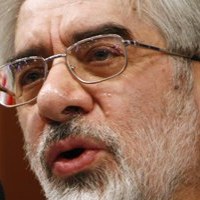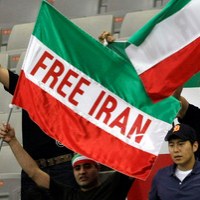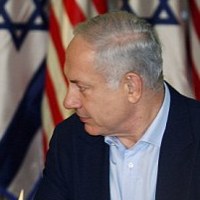![]()
Sun, Oct 9, 2011 | The Meir Amit Intelligence and Terrorism Information Center

The 5th International Conference on Palestinian Intifada at the Summit Conference Hall in Iran's Capital of Tehran. (Source: PressTV.ir)
Supreme Leader makes decision about Iran’s stance towards Abu Mazen’s plan: Palestine from the river to the sea
Last weekend the 5th International Conference in Support of the Palestinian Intifada was held in Tehran. The conference was attended by more than 50 delegations from dozens of countries, including Qatar, Lebanon, Syria, Jordan, Iraq, Egypt, Indonesia, Kuwait, Oman, Sudan, Pakistan, Sri Lanka, Afghanistan, Malaysia, Zimbabwe, Malawi, Ivory Coast, Tanzania, Paraguay, Mexico, Colombia, Cuba, Bolivia, Kyrgyzstan, and Hungary.
In a speech given on the first day of the conference, Supreme Leader Ali Khamenei said that a solution where a Palestinian state is established in only part of Palestine and the State of Israel is recognized can’t be accepted. He asserted that any plan that seeks to divide Palestine has to be rejected. The implication of the proposal to establish two states is concession to Zionist demands and recognition of a Zionist state on Palestinian land. Such a plan ignores the historic rights of the Palestinians and threatens the rights of those Palestinians living in the 1948 territories. It perpetuates the “cancerous tumor” (Israel), facilitating the continued existence of the threat posed to the Muslim nation and the peoples of the region.
Khamenei stressed that any practical proposal has to be based on the principle that “all of Palestine belongs to the Palestinian people” and “Palestine — from the river to the sea”. The Palestinians can, of course, liberate parts of Palestinian land gradually, as they did in Gaza, but the ultimate goal — liberating all of Palestine — must never be abandoned. He added that achieving this goal will require actions rather than words. The governments, the Muslim nations, and the resistance groups in Palestine, Lebanon, and other countries must play a part in the long struggle for the liberation of Palestine.
The Supreme Leader outlined Iran’s proposed solution to the Palestinian issue. Iran does not support, he said, a classical war between armies or throwing the Jews who immigrated to Palestine into the sea, but rather a referendum among the Palestinian people. All the original inhabitants of Palestine — Muslims, Christians, and Jews living in Palestine and elsewhere, but not the foreign immigrants who came to Palestine over the years — will be allowed to take part in the referendum and decide on the future of Palestine. The fate of the non-Palestinian immigrants who came to Palestine will be decided by the regime established following the referendum. It is a just and reasonable solution supported by global public opinion.
Khamenei called on Muslim states to cut off their public and covert ties with Israel. Countries that have relations with Israel cannot claim to support the Palestinians, and no slogan they make against the Zionists can be taken seriously. He also called on the Islamic resistance organizations to continue their fight to liberate Palestine and on Western countries to stop supporting Israel, because otherwise they will suffer badly in the not-too-distant future.
The real threat to Israel, Khamenei said, comes not from Iran’s missiles or the Islamic resistance groups, but from the determination of the men, women, and youths in Muslim countries (Fars, October 1).
The Supreme Leader’s speech was emphasized by the Iranian press, which, following Khamenei’s remarks, expressed adamant opposition to PA Chairman Mahmoud Abbas’ political plan and his appeal to the UN for recognition of independent statehood within the 1967 borders.
The reformist daily Resalat said that there is a consensus among the Palestinians and the Muslim world about the strategy required to contend with the Zionists: transferring sovereignty from the Zionists to the Palestinian people by means of a referendum. Mahmoud Abbas, supported by the Zionists, creates disagreements among the Palestinians to foil this strategy, but the attempt to divide Palestine will never bear fruit. The PLO cannot foil the true aspirations of the Palestinian people by appealing to the UN. The second Lebanon war and the war in Gaza are proof that the resistance is able to pull Israel out of the heart of the Muslim world through sacrifice and struggle (Resalat, October 2).
The daily Jomhuri-ye Eslami said that the Supreme Leader’s remarks are extremely important, since those who attended the international conference could clearly hear him say that he is categorically opposed to the proposal to establish a Palestinian state in only 22 percent of the territory of Palestine and give away the remaining territory to the Zionists, and that all of Palestine belongs to the Palestinian people.
The Supreme Leader’s stance reaffirms Iran’s policy towards the Palestinian issue, and is particularly significant considering President Ahmadinejad’s statements in New York, which may have given the impression that Iran accepts Abu Mazen’s plan — one that is tantamount to recognition of the “Zionist occupation regime”.
In addition, the Supreme Leader emphasized the bond between Palestine and the Muslim nation. The issue of Palestine is not just the concern of the Palestinians and Arabs living in the region, it is a fundamental issue that touches upon the entire Muslim world. The atmosphere in the region has changed considerably as a result of the Islamic awakening in the Arab world, and the relative power of those who support the resistance can now be felt.
The daily accused Abu Mazen of betraying the Palestinian people and collaborating with the Zionists with the purpose of making up for his defeats and hitting the resistance. The Western world and the Zionists are only using him to suppress the Palestinians. How does Abu Mazen intend to establish a state in a small part of Palestinian territory without an army or air force, without Jerusalem, and without the return of 4.5 million Palestinian refugees to Palestine? His appeal to the UN is tantamount to recognition of the occupation of Palestine, recognition of the occupiers, and commitment to give up the right to resist the occupation.
Israel’s ongoing policy of settlement and occupation of Palestinian land show, according to the daily, that force is the only language the occupiers understand, and the expansion of anti-Zionist resistance is the only consequential way of dealing with the enemy, which will only yield under pressure (Jomhuri-ye Eslami, October 2).
The daily Keyhan was also categorically opposed to any compromise on the Palestinian issue. In an editorial titled “This is Tehran, capital of the revolution”, the daily said that as long as the “cancerous tumor” remains standing, there will be no peace anywhere in the Middle East. Twenty years into the peace talks, first in Madrid and then in Oslo and Washington, no objective observer believes anymore that the way to the realization of the Palestinians’ rights is through negotiations, peace conferences, or agents like Mahmoud Abbas.
There is no question that all of Palestine, from the Jordan River to the Mediterranean Sea and from south Lebanon to north Egypt, belongs to the Palestinian people, and no one has the right to give up a single piece of Palestinian land, let alone give away 80 to 90 percent of it to the occupiers (Keyhan, October 2).
Following Khamenei’s lead, Tehran Emrouz, a daily close to Tehran’s mayor Mohammad Baqer Qalibaf, also expressed opposition to the plan proposed by Abu Mazen.
Speaking about the statement made by President Ahmadinejad in New York, according to which the establishment of a Palestinian government within the 1967 borders is the first step towards the realization of the Palestinians’ rights, the daily claimed that this statement ignores its own implications: that is, recognition of the Zionist regime, denial of Palestinian claims to territories occupied prior to the 1967 war, and disregard for the refugee problem. The daily said that some politicians, wittingly or not, have fallen into the trap of the establishment of a Palestinian state as a first step. The fate of Palestine will not be decided in the UN or at the negotiating table; instead, it will be decided through the determination, willpower, and faith of the Palestinian people and the other Muslim nations.
The idea of “from the Nile to the Euphrates”, on which the illegitimate State of Israel was established, should be countered by the expansion of the “freedom-and independence-loving” thought of “Palestine — from the river to the sea”, not only among Palestinians, but also among all Arab and Islamic nations. The reality of Palestine being liberated from the claws of Zionism in the not-too-distant future has to be recognized. No military force — not the Israeli army, not Western armies — can prevent this reality when considering the waves of resistance in the Muslim world. The future of Palestine has to be decided by Palestinians, not by foreigners who use Israel to expand their influence in the region and plunder its resources.
Obviously, the United States and the Western world will never agree to a proposal to let the Palestinian refugees come back and hold a referendum of the Palestinians to decide on Palestine’s fate. However, just like the Islamic revolution and the uprisings of the Muslim nations in the region were forced upon them, the realization of the Palestinians’ rights will be forced upon them as well, and no Palestinian territory can be handed over to the enemy (Tehran Emrouz, October 2).



 RSS
RSS










Supreme Leader makes decision about Iran’s stance towards Abu Mazen’s plan: Palestine from the river http://t.co/75tlM7Se
Supreme Leader makes decision about Iran’s stance towards Abu Mazen’s plan: Palestine from the river http://t.co/75tlM7Se